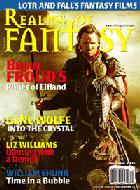"Dancing Day" by Liz Williams
"Of Soil & Climate" by Gene Wolfe
"Divided by Time" by William Shunn
"Romanticore" by Tim Pratt
"Yamabushi" by Richard Parks
 Realms of Fantasy brings a good year to an end with five entertaining, well-written stories, four of them combining complex characterization and layers of possible meaning with satisfying action, and one stylishly turning a familiar trope inside out.
Realms of Fantasy brings a good year to an end with five entertaining, well-written stories, four of them combining complex characterization and layers of possible meaning with satisfying action, and one stylishly turning a familiar trope inside out.
This latter is the first story, "Dancing Day," by Liz Williams. Instead of the young woman being possessed by a demon, in this world (Istanbul is Constantinople, in 1923) the demon finds herself possessed by the young lady, and trapped in her fragile body. She cannot get out, and hopes the exorcists can do something for her. I found the idea stronger than the execution, despite the lovely prose. It seemed that in copping, perhaps, to the hip-but-familiar trope of the pagan priestess who really has all the power, Williams tripped over her own metaphysics: in a world where demons are real, and they have indeed possessed people, if the families of the victims call in priests from the churches, well, doesn't that mean that their rituals worked? If it's only the pagans who can do real exorcism, then why weren't they the first ones called in? The second half of the story is not as interesting as the first; in fact, by the end this seems less a story than an anecdote, but an entertaining one due to Williams' skill with words.
Gene Wolfe's "Of Soil & Climate" is the strongest story of the issue, and in my view one of the best of the year for ROF. Here, Wolfe explores another familiar trope, the man from this world who finds his way to a fantasy world, but that is the last recognizable signpost for the reader who follows Tuck, a psychiatrist who is doing time in prison, into the twilight world where the Sun People battle the Night People. He meets a courteous beast, a woman married to a tree, and a beautiful princess, does battle and gains a sword, while trying to find his way back, at least in memory. Read it slowly, savoring the deliberate withholding and revelation of details that illuminate, by a master hand, a landscape wherein time's measure is by the standards of nightmare, where the endless forest seems pleached by the shadowy shoots of imagination, of memory and of madness.
"Divided by Time," by William Shunn, follows Donny Chavez, a young man living in Salt Lake City who, while trying to deal with his despair over his girlfriend, Grace, who departed to Israel, stumbles on an odd little shop. Once again a familiar trope, and once again what happens is completely unpredictable. Donny explains his situation to the proprietor, and for a pricehis vishuddha, his resignation to fatehe is given a time capsule. From there Donny explores the world, or rather the possible worlds intersecting with the expected world. The prose is some of Shunn's best during this extended middle section. By the time Donny finds Grace in Jerusalem, and they wander for a time happily among the ancient religious landmarks, he has become a different person. Given once again a choice, this time he acts instead of reacts, leading to a nifty ending that is impossible to guess.
"Romanticore," by Tim Pratt, is a tale of love, desire, possession and loss, told in a wonderful voice. Pratt is aware of all the clichés that he might fall into, and doesn't just avoid them, he plays with them before he rips them apart and gives them new shape, usually as a tight and skillful transition. Here are a couple of typical ones: "I drained my beer and looked into the smudged-up mirror behind the bar. (No, I'm not gonna take this staring-in-the-mirror-moment opportunity to describe my face. . . .)"
And this one: "Was Lily just a rebound? Shit, in my vocabulary, the only thing rebound' means is the bounce off a backboard in basketball. I've been going from woman to woman my whole life; it's less a rebound and more like a skipped stone, or chain-smoking." Last: "I can't decide if all this is boring or not, if you care about the good times, or if you're just waiting for the monsters to start jumping out of the closet…" A good yarn, made excellent not just by Pratt's masterly narrative voice, but by his insight into human emotion and motivation.
A tough act to follow, but Richard Parks manages with "Yamabushi." Parks is a name I always look forward to seeing in any table of contents; his writing is consistently vivid, subtle in characterization, strong in pacing, his stories unpredictable. In this story, the warrior Minamoto no Enyo quits after a famous battle, shaves his head, and takes off into the holy mountainsnot to become a monk, but just to walk in the mountains and fish. He meets a tengu, a demon whose special delight is to confound monks struggling for enlightenment; Enyo's indifference both disarms and maddens the tengu, which uses its powers first to tempt and then to comprehend Enyo, who in his turn insists there is nothing to comprehend. But if there really is nothing, what is he doing in the holy mountains? Another ending impossible to predict, bringing to a close a particularly satisfying issue.